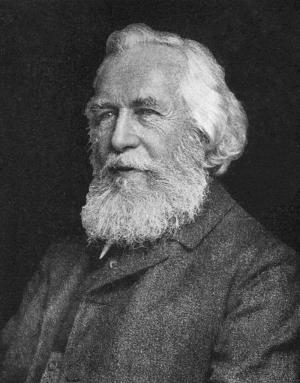
I’ve been meaning to write about William Bell Riley (1861–1947), a Baptist preacher who was as responsible for the flourishing of the antievolution crusade of the 1920s as anyone. In some ways, Riley wasn’t a stereotypical creationist. He wasn’t in the Bible Belt, for example: he spent forty-five years as the pastor of the First Baptist Church of Minneapolis. And he wasn’t a young-earther, either: he insisted that there wasn’t “an intelligent fundamentalist who claims that the earth was made six thousand years ago; and the Bible never taught any such thing,” and repeatedly debated his colleague Harry Rimmer on the age of the Earth. (Toward the end of his life, though, there were signs that he might have been rethinking his day-age position, as William Vance Trollinger Jr. describes in his preface to The Antievolution Pamphlets of William Bell Riley [1995].)
Yet Riley was consistently and fiercely against evolution. In a pamphlet published as Darwinism; or, Is Man a Developed Monkey? (1929), adapted from a chapter of his The Finality of the Higher Criticism; or, The Theory of Evolution and False Theology (1909), for example, he argued, “First, the Theory is Unscientific; second, the Theory is Unscriptural; third, the Theory is Anti-Christian.” And through the World’s Christian Fundamentals Association (which he founded in 1919) and the Anti-Evolution League of America (which he founded in 1923), he brought his views to the public, calling for bans on teaching evolution. It was the WCFA, in fact, that recruited William Jennings Bryan to aid the prosecution team in the Scopes trial. Riley was later, in 1927, unsuccessful in establishing such a ban in his home state of Minnesota.
I’ll be returning to Riley, but for now I want to discuss a passage in Darwinism; or, Is Man a Developed Monkey? that caught my eye. Riley writes, “The most suggestive words, however, and really the severest criticism on evolution, though not spoken with that intent, are from Professor Ernst Haeckel, of Jena, Germany’s greatest biologist, and the rankest naturalistic evolutionist of recent date. In his latest utterances, he bewails the fact that he is standing almost alone. ‘Most modern investigators of science have come to the conclusion,’ he says, ‘that the doctrine of evolution and particularly Darwinism is an error and cannot be maintained.” He continues to enumerate the investigators cited by Haeckel (seen above): “Dr. E. Dennert...Dr Goette…Prof. Edward Hoppe…Professor Paulson…Professor Rutemeyer…and Professor Wilhelm Max Wundt.”
The passage is plagiarized wholesale from Luther Tracy Townsend’s Collapse of Evolution (1905), which, as Ronald L. Numbers notes in The Creationists (1992), “assembled one of the earliest—and most frequently cribbed—lists in order to prove that ‘the most thorough scholars, the world’s ablest philosophers and scientists, with few exceptions, are not supporters, but assailants of evolution.’” Naturally, neither Riley nor Townsend nor any of the other antievolutionists I’ve noticed quoting the passage from Haeckel—including Philip Mauro in Evolution at the Bar (1922) and Leander Lycurgus Pickett in God or the Guessers (1926)—identify its source. But the fact that it occurred in Haeckel’s “latest utterances” circa 1905 offers a clue: I guessed that it was taken from Die Welträtsel (1895–1899), translated into English by Joseph McCabe as The Riddle of the Universe (1900).
On consulting The Riddle of the Universe, I didn’t find the passage. There’s certainly no suggestion there that evolution is falling into scientific disrepute: on the contrary, Haeckel writes, “the science of evolution (in the broadest sense)…has now become the sure foundation of our whole world-system,” and describes Darwin as “the Copernicus of the organic world” (emphasis in original). On consulting the German original, however, I found, “Diese ‘modernsten’ Naturforscher sind zu der Ueberzeugung gelangt, daß die Entwickelungslehre und insbesondere der Darwinismus eine haltlose Irrlehre ist, und daß ‘Geschichte überhaupt keine Wissenschaft’ ist,” which I translate as “These very ‘modern’ naturalists have arrived at the conviction that the theory of evolution, and Darwinism in particular, is a baseless heresy, and that it is ‘history, not science at all.’”
That’s recognizably the passage. But where did Townsend find it? The likeliest source is J. H. W. Stuckenberg’s “Religious and Social Thought and Movement at the Beginning of the Twentieth Century,” published in The Homilectic Review in 1900. Stuckenberg (1835–1903), a Lutheran pastor and scholar, was born in Germany and spent a lot of time in Germany—to the point that the state of Massachusetts threatened to revoke his right to vote there, according to a short biography posted by Gettysburg College. So it’s not surprising that, in his article, he replies to a question about whether there are any leading scientists who reject evolution by translating a sentence from Die Welträtsel: “These ‘most modern’ investigators of science have come to the conclusion that the doctrine of evolution, and particularly Darwinism, is an error and can not [sic] be maintained.”
I translated Haeckel’s “‘modernsten’” as “very ‘modern,’” while Stuckenberg (whose command of German was surely better than mine is) translated it as “‘most modern.’” (Both of us retained Haeckel’s shudder quotes. Translating it without shudder quotes would call for a more visibly sarcastic adjective: perhaps “oh-so-modern”?) The meaning is basically the same, of course, but Stuckenberg’s version apparently engendered confusion in Townsend and his followers, who must have read “These ‘most modern’ investigators…” as “Most modern investigators…” Haeckel certainly wasn’t claiming that most modern investigators now reject evolution (and Stuckenberg wasn’t saying that he was); in fact, in the same passage, Haeckel claims that the vast majority of modern naturalists regard evolutionary theory as the greatest advance in biology of the (nineteenth) century!

